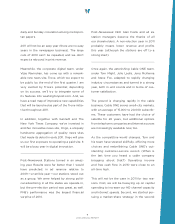Washington Post 2010 Annual Report Download - page 21
Download and view the complete annual report
Please find page 21 of the 2010 Washington Post annual report below. You can navigate through the pages in the report by either clicking on the pages listed below, or by using the keyword search tool below to find specific information within the annual report.requirement of preparing students for gainful employment in a recognized occupation. See Gainful Employment section
below. The topics covered in the final regulations published on October 29, 2010, with an effective date of July 1,
2011, include, but are not limited to, the following:
• Revisions to the incentive compensation rule (see Incentive Compensation section below);
• Expansion of the notice and approval requirements for adding new academic programs and new reporting and
disclosure requirements for academic programs;
• Revision and expansion of the types of activities that are deemed a “substantial misrepresentation” and the ability of
the Department of Education to enforce the provisions;
• Requirement that states authorize institutions and set forth certain minimum requirements to obtain such authorizations
(see State Authorization section below);
• Limiting agreements between related institutions;
• Defining a “credit hour”;
• Administration of ability-to-benefit examinations;
• Student attendance requirements;
• Proof of high school graduation;
• Verification of information included on student aid applications;
• Satisfactory academic progress;
• Retaking coursework;
• Return of Title IV funds; and
• Disbursements of Title IV funds.
The implementation of the final regulations will require Kaplan Higher Education to change its practices to comply with
these requirements and could increase its administrative costs.
Gainful Employment. In the July 2010 NPRM, the Department of Education published proposed regulations that purport
to tie an educational program’s eligibility for Title IV funding to whether the program leads to gainful employment in a
recognized occupation. The Department of Education plans to issue final gainful employment regulations in early 2011.
The proposed regulations define an educational program that leads to gainful employment as one that complies with
benchmarks based on (1) annual student loan repayment rates and (2) an annual student debt measure comparing the
median annual student loan payment to average annual student earnings and to student discretionary income. The various
measures would be calculated under complex formulas prescribed in the proposed regulations and would be based in
part on data that are not available to schools. Under the regulations as currently proposed, and which are subject to
change, certain school programs would only be fully eligible for Title IV funding if either at least 45% of their former
students are repaying the principal on their federal loans, or their graduates have a debt-to-earnings ratio of less than
20% of discretionary income or 8% of total income. These schools’ programs would be ineligible for Title IV funding if
such programs had less than 35% of their former students paying down the principal on their federal loans; and their
graduates had a debt-to-earnings ratio above 30% of discretionary income and 12% of total income. An educational
program that fails to meet one or both benchmarks could lose its Title IV eligibility, be placed on restricted status, be
required to provide annual employer affirmations that the program aligns with recognized occupations and that there is
expected demand for those occupations, be subject to limits on enrollment of Title IV recipients and/or be required to
provide disclosures and warnings to current and prospective students that they may have difficulty repaying loans
obtained for attending that program. An institution with one or more ineligible programs or programs on restricted status
would be subject to provisional certification.
Under the terms of the proposed regulation, for the award year beginning July 1, 2012, only the lowest performing
programs, accounting for 5% of all graduates during the prior year, would be subject to losing eligibility. The full gainful
employment regulations would not go into effect until the award year beginning July 1, 2013.
The Company cannot currently predict with reasonable accuracy the impact the proposed regulation would have on its
program offerings if it were enacted in its current form, nor can it predict with reasonable accuracy the final form or
impact of the final regulation. The proposed regulations are not final and remain subject to further review and change.
However, the implementation of the regulation as proposed, or any other changes the Department of Education may
implement, would require Kaplan to eliminate or limit enrollments in certain educational programs at some or all of its
schools and would materially impact the rate at which students enroll in programs at those schools and, therefore,
2010 FORM 10-K 5
























